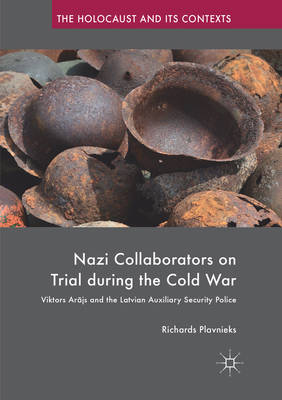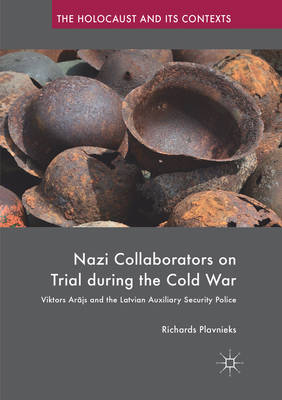
Door een staking bij bpost kan je online bestelling op dit moment iets langer onderweg zijn dan voorzien. Dringend iets nodig? Onze winkels ontvangen jou met open armen!
- Afhalen na 1 uur in een winkel met voorraad
- Gratis thuislevering in België vanaf € 30
- Ruim aanbod met 7 miljoen producten
Door een staking bij bpost kan je online bestelling op dit moment iets langer onderweg zijn dan voorzien. Dringend iets nodig? Onze winkels ontvangen jou met open armen!
- Afhalen na 1 uur in een winkel met voorraad
- Gratis thuislevering in België vanaf € 30
- Ruim aanbod met 7 miljoen producten
Zoeken
Nazi Collaborators on Trial During the Cold War
Viktors Arājs and the Latvian Auxiliary Security Police
Richards Plavnieks
€ 126,95
+ 253 punten
Uitvoering
Omschrijving
This book is a study of the legal reckoning with the crimes of the Latvian Auxiliary Security Police and its political dimensions in the Soviet Union, West and East Germany, and the United States in the context of the Cold War. Decades of work by prosecutors have established the facts of Latvian collaboration with the Nazis during the Holocaust. No group made a deeper mark in the annals of atrocity than the men of the so-called 'Arajs Kommando' and their leader, Viktors Arājs, who killed tens of thousands of Jews on Latvian soil and participated in every aspect of the 'Holocaust by Bullets.' This study also has significance for coming to terms with Latvia's encounter with Nazism - a process that was stunted and distorted by Latvia's domination by the USSR until 1991. Examining the country's most notorious killers, their fates on both sides of the Iron Curtain, and contemporary Latvians' responses in different political contexts, this volume is a record of the earliest phases of this process, which must now continue and to which this book contributes.
Specificaties
Betrokkenen
- Auteur(s):
- Uitgeverij:
Inhoud
- Aantal bladzijden:
- 297
- Taal:
- Engels
- Reeks:
Eigenschappen
- Productcode (EAN):
- 9783319862217
- Verschijningsdatum:
- 10/08/2018
- Uitvoering:
- Paperback
- Formaat:
- Trade paperback (VS)
- Afmetingen:
- 160 mm x 208 mm
- Gewicht:
- 362 g

Alleen bij Standaard Boekhandel
+ 253 punten op je klantenkaart van Standaard Boekhandel
Beoordelingen
We publiceren alleen reviews die voldoen aan de voorwaarden voor reviews. Bekijk onze voorwaarden voor reviews.











